The Longest Run: Olympics about more than winning for Refugee team
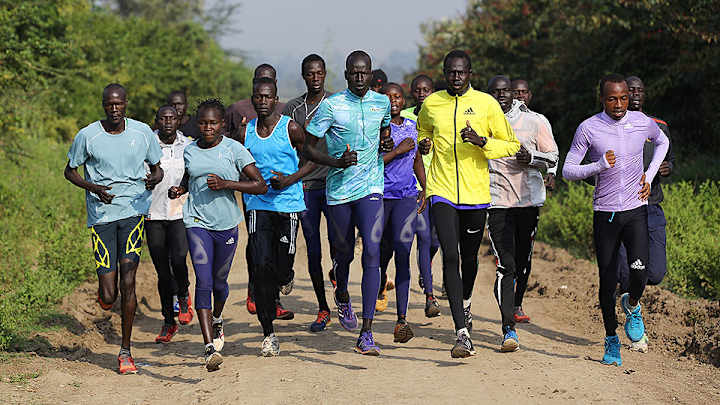
For six weeks, from the Olympics opening ceremonies to the Paralympics closing, men and women represent their country with one common goal in mind: Gold. Subscribe now for SPORTS ILLUSTRATED’s in-depth coverage.
They ran. So goes the first act of a refugee: a scramble for food or clothing, a grab of the nearest helping hand, flight. Were the soldiers coming to take territory? Coming for forced conscripts the way they did two years before, when Yiech Pur Biel’s father ran and never came back? In those first moments it didn’t matter; the soldiers were coming. So Biel and his mother, two sisters and younger brother rushed out of their home, five more drops in the human flood rushing into the scrubby forest outside the town of Nasir, in the northeast of what would soon become South Sudan.
This was 2005. What month? Biel doesn’t remember. What season? He can’t say. He was 10 then, an age when time means little but the loss of home feels like the earth cracking. "When they attacked us," he says, "I saw it was the end of my life with my family."
It got worse. Biel—who would grow up intent on proving, along with the nine other members of the Refugee Olympic Team at the Rio Games, that refugees “are not animals”—then took what is often the next step. He lived like an animal. Hiding in the bush, senses on high alert, no food to be had. For three days his family, sleepless, bellies screaming, foraged for fruit and climbed trees for their bitter leaves.
Finally Biel's mother, Nyagony, made a decision. The border with Ethiopia was only 19 miles away, a week's walk; maybe they could get food there. Biel was the oldest boy. There was no avoiding the cruel calculus: She could handle three children on the road but not four. "You see," Biel says, "if I am 10 years, I can survive without her, maybe."
He tried to understand. His mother placed him with a woman from their neighborhood, gathered his brother and sisters and went. So began the refugee's third, most wrenching act, the separation endured worldwide, in some form, by more than 21 million refugees and another 44 million forcibly displaced people. Biel has not spoken to his mother and siblings since then. He doesn't know if they survived the trek, the soldiers, the years.
• The Unbeatables: U.S. women’s eight is the most dominant team in Rio
While relating all this in July, during a break at the Tegla Loroupe Training Center in Ngong, Kenya, about 14 miles outside Nairobi, the 21-year-old Biel speaks in a high monotone, his face giving away nothing. He says he cried the day his mother left him, but it wasn't his worst moment. That came after, when he went with the neighbor lady and her two children back to Nasir and found his hometown in ashes. "They burned everything," he says of the soldiers. "There was nothing: The village has gone. They took animals, even killed some. The army go away. All that remained were the dead people."
That's when Biel knew: He was lost. The neighbor lady would be going now, surely, and he was terrified that she, too, would do the math, “turn against me” and leave him behind. “I thought it was my end,” he says. So for the next 24 hours, one full day, the boy waited for his dying to begin.
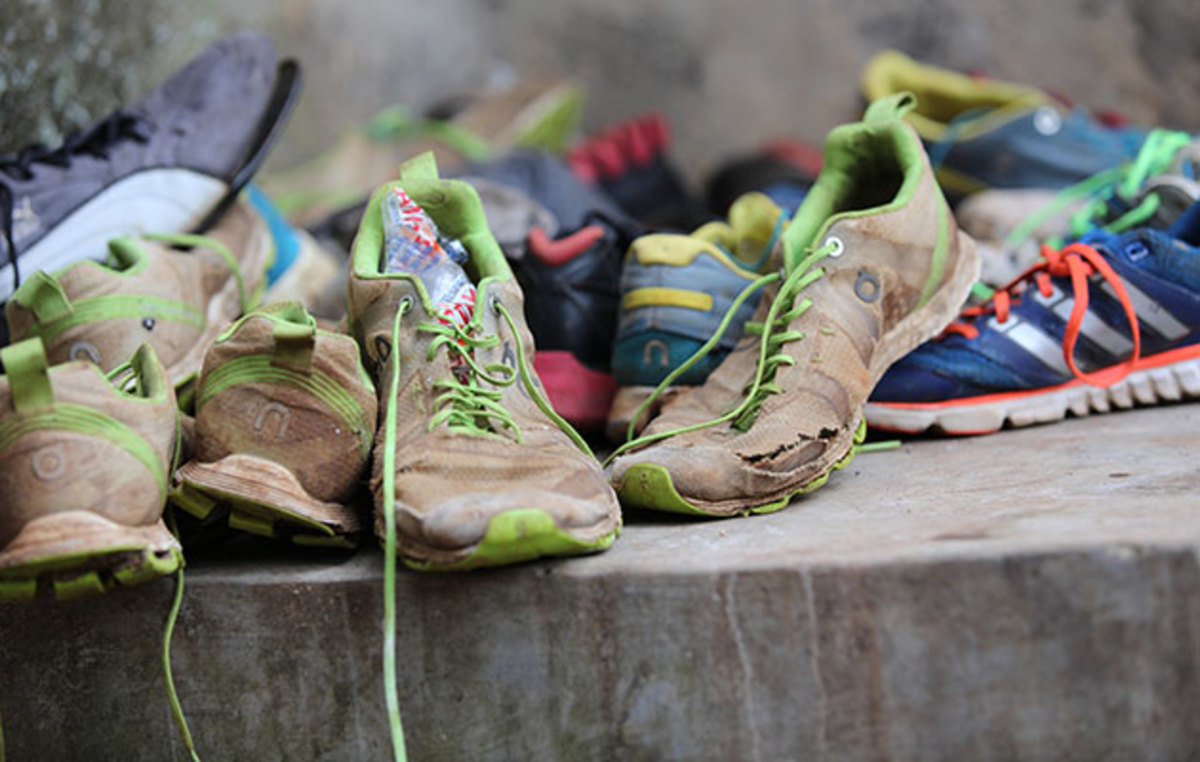
When International Olympic Committee president Thomas Bach announced the 10 members of the first-ever Refugee Olympic Team in June—after a yearlong global vetting by 17 national Olympic committees and the United Nations Refugee Agency and after countless tryouts in Europe and Africa that resembled nothing so much as the hunt for Willy Wonka's golden tickets—he clearly intended the impact to redound far beyond sports. “A symbol of hope to all the refugees in our world,” Bach called the squad. “It is also a signal to the international community that refugees are our fellow human beings and are an enrichment to society.
“These refugees have no home, no team, no flag, no national anthem. We will offer them a home in the Olympic Village together with all the athletes of the world.”
A cynic might call this a stroke of marketing genius. What with endless reports out of Rio about depleted budgets, political collapse, social unrest, the Zika virus and the consequent withdrawal of high-profile athletes; amid striking allegations of systematic doping by traditional powers Russia and Kenya; and after making laughable bets that staging recent Olympics in China and Russia would improve those countries' human rights records, the Olympic brand has taken a savage beating. A bit of humanitarian counterprogramming, smacking of Baron Pierre de Coubertin's ideals, surely couldn't hurt.
"We need to remind [people] that sport is a unique tool to improve society," says Pere Miró, whose IOC title is deputy director general for relations with the Olympic movement. "This is ... a kind of hope for some people that can get us back to our roots."
To be fair, Bach had been thinking about pairing the worldwide refugee crisis—the worst since World War II—and the Olympics almost from the moment he took office in September 2013. Tegla Loroupe, the Kenyan marathon legend, had been scouting and training talented South Sudanese refugees for years; Bach spoke to her that fall about expanding the work worldwide, and last September the IOC authorized $2 million in funding for the effort. "I was always wishing that I had somebody to help me," says Loroupe, whose training camp welcomed 30 refugee runners last October. "If it was not for IOC, I couldn't support these athletes."
Meanwhile, the crisis is so great, and the journeys of some athletes have been so harrowing, that the Refugee Team's march into Maracanã Stadium under the Olympic flag during the opening ceremony, just before Brazil's delegation, figures to be irresistible. There will be swimmer Yusra Mardini, 18, of Syria, where a five-year civil war has killed more than 400,000 people and scattered four million refugees across the Middle East and Europe. In the summer of 2015, Mardini, one of Syria's top freestylers, boarded an inflatable dinghy in Izmir, Turkey, bound for the Greek island of Lesbos. When the boat's motor died, she jumped into the Aegean Sea with her older sister, Sarah, and another refugee and kicked for three hours, pushing and pulling the boat to safety. "I hated the sea after that," Yusra said at a news conference in March.
• Rio’s Olympians: Like the city, they’re overcoming own obstacles
Land didn't treat her much better. The women trekked and rode trains for 25 days through Greece, Macedonia, Serbia, Hungary (where they were detained in a refugee camp before escaping) and Austria before settling in Berlin. By late autumn Mardini had found a pool and a coach. Her compatriot Rami Anis, 25, a butterflyer, was not far behind.
Shaken by the bombings and kidnappings in his hometown of Aleppo, Anis had flown to Istanbul in 2011 with two pairs of pants, two T-shirts and two jackets, expecting to stay there with an older brother for a short time. Four years later, one night in October, Anis paid smugglers to ferry him and his younger brother from Izmir to the Greek island of Samos. It took another nine days for them to travel overland through Macedonia, Serbia, Croatia, Hungary, Austria and Germany to Belgium, where they decided to stay.
"The part at sea was the worst," Anis says. "As a swimmer, I was worried because we were going to take a raft with children and old people. You have to imagine everything: What if the boat toppled? Of course, I would not only swim and rescue my life ... I would try to help as many people as possible. It was terrible to go through this experience. Thankfully, it passed."
The Syrian war, of course, was the main source of the more than one million refugees who flowed into Europe in 2015, a surge that, paired with fears of terrorism, is challenging (and often transforming) the politics, culture and self-image of every country from Greece to Great Britain. But long-standing conflict, drought and instability also scattered 160,000 Ethiopians in that time, including Refugee Team marathoner Yonas Kinde, 36, who has been living, running and driving taxis in Luxembourg since 2011. "I left because of political problems," Kinde told the IOC, "but I am here and I am lucky."
No Olympic refugees, however, have been flung farther than judokas Popole Misenga, 24, and Yolande Mabika, 28. A five-year civil war in the Democratic Republic of Congo killed some 5.4 million people—including Misenga's mother—before officially ending in 2003, but continued fighting in the east, including the judokas' hometown of Bukavu, has since forced 450,000 people to flee. Misenga and Mabika defected during the 2013 world championships in Rio and never left the city. Mabika, separated from her family as a child, is hoping that her Olympic fame just might be seen by her father, mother or brother, prompting them to reach out.
• Big Finish: Usain Bolt chasing three more golds in his final Olympics
Their routes to these Games differ, but all the Olympic refugees share the same mission: to change the conversation. They know that refugees have become easy scapegoats in scared societies, easy applause lines for politicians and all too easy to caricature as criminal or unclean. In Rio they hope to present an alternative to all the wire photos of crowded camps and dead bodies washed ashore, relieve the basic human fear of the other. They want to show that they can march in a parade, wave, smile, run and compete—just like everyone else.
"It is very challenging when you are chased away from your homeland," says Anjelina Nadai Lohalith, 22, a 1,500-meter runner from South Sudan. "Nobody can feel happy when you are chased or you stay in another country. But right now I feel proud. I'm proud to be a refugee.
"We are representing the millions of refugees all over the world. Maybe, in years to come, I will represent myself. But at this moment we are their light. Wherever they are, at least they will now have some encouragement and know: We can do something. Wherever they are, they are human beings. They are not animals. That's why we have been given this chance. So they should not be looked down on. Or treated unfairly."
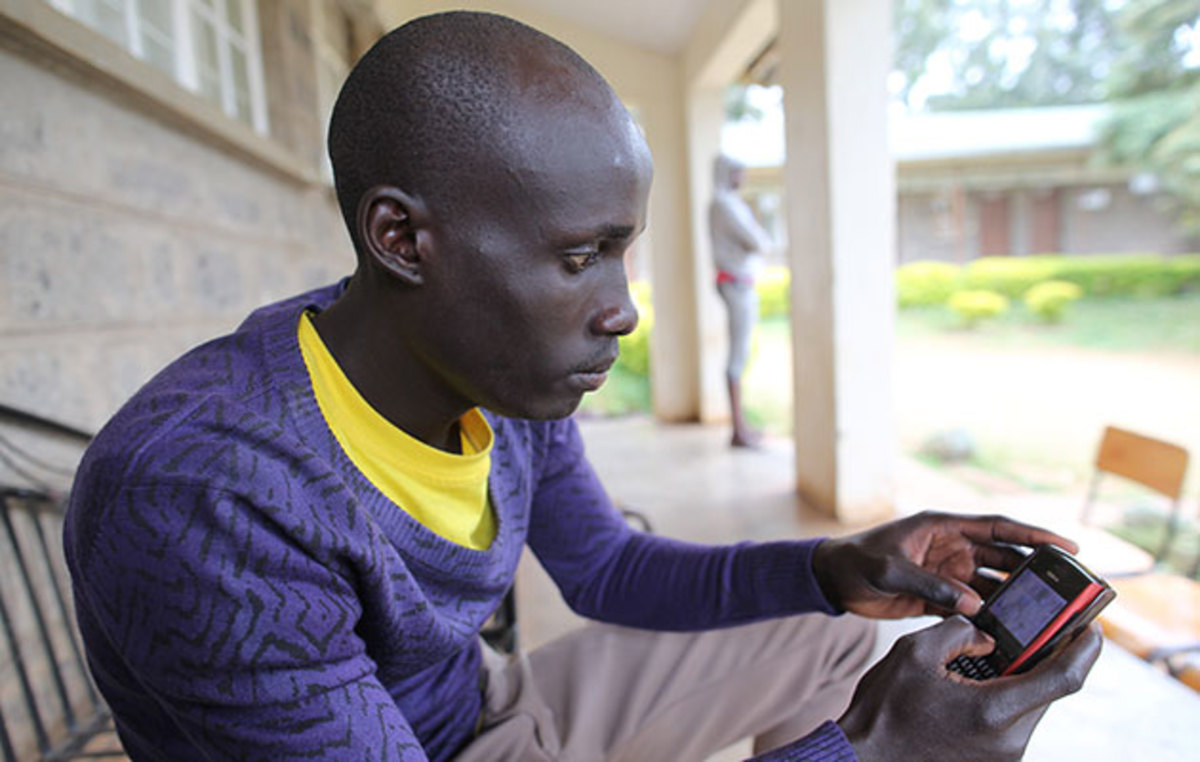
Late on Friday, July 8, word came in that James Nyang Chiengjiek's home was dropping once more into hell. Chiengjiek, 28, a South Sudanese 800-meter runner whose father was killed in 1999 during the Sudanese civil war, had fled his village at 13 to avoid being kidnapped by the soldiers who snatched two of his friends. Now he stood outside the social hall at Loroupe's training center. A teammate walked up, fresh off a phone call from South Sudan's capital. "Fighting has broken out in Juba," he said.
Artillery, machine-gun fire: Forces aligned with the president were battling those loyal to the vice president. A tenuous peace in the country's latest, 32-month civil war—with a "unity" government paralyzed by internal distrust—was unraveling fast. Chiengjiek wasn't upset. "No, no, it's good," he said. One side would finally beat the other into submission, he figured, "and after this all the fighting will stop."
In truth, the road to a clear resolution figures to be long and brutal. At least 300 people died and 40,000 fled Juba in the ensuing four days, casting fresh doubt on the viability of the world's youngest nation. A shattered economy had already forced cancellation of festivities marking South Sudan's fifth birthday, and it was just as well; since independence the nation has done little to be proud of. More than half its children don't attend school. In March the United Nations accused the government of war crimes that include the mass murder of civilians and allowing soldiers to rape women in lieu of being paid. South Sudan, the UN report concluded, has created "one of the most horrendous human rights situations in the world."
It seems only right, then, that fully half of the 2016 Refugee Team—Biel, Lohalith, Chiengjiek, 800-meter runner Rose Nathike Lokonyen and 1,500-meter runner Paulo Amotun Lokoro—call South Sudan home. Aside from age-old disrupters like war and famine, South Sudan features some of the most extreme abuses that drive off today's refugees. Chiengjiek first "ran," as all the runners call it, because the army wanted to brainwash children into being soldiers. Meanwhile, half of South Sudanese girls between 15 and 19—and some as young as 12—are subjected to forced marriage. Lohalith decided, at all of nine years old, to go with an aunt to Kenya because her Didinga community expected her to submit to early marriage.
“But I was planning to go to school by then,” she says. “I was wishing to become a doctor.”
• Olympic media roundtable: Concerns and thoughts about Rio Games
Political and tribal authorities aren't the only ones creating nightmares. Separating mostly Christian South Sudan from Muslim-dominated Sudan in 2011 seemed a fairly straightforward task compared to reconciling the nation's warring ethnicities. The dominant Dinka and Nuer tribes have forever battled for power, which helps explain the current hostilities: on one side the Dinka, led by president Salva Kiir, and on the other the Nuer, led by vice president Riek Machar. And though some 650,000 South Sudanese have bolted the country since the conflict began in 2013, they didn't leave those tensions behind.
All five South Sudanese runners came through the 25-year-old Kakuma Refugee Camp, a holding area for 185,000 people in northwestern Kenya. "When refugees fight [among] themselves, you face a lot of challenges," says Lokonyen, 23, who lived in Kakuma from the time she was nine until last fall. In 2014 the Dinka and the Nuer battled there for weeks with sticks, guns and the machetes called pangas. "So many people were dying in that fighting," she says, gesturing to the back of her neck. "I saw: They were cutting one of the young kids, he was Dinka, cut by panga. He passed away. One of my tribe—Didinga—was killed as well."
Preventing tribal divisions from infecting the Ngong training center was a priority when the 30 runners began arriving last October. "It wasn't easy, let me tell you," Loroupe says. She has had more experience with this than most: Since 2001 the two-time winner of the New York City Marathon has persuaded rival East African warlords and politicians to run together in well over a dozen "peace races." Aided by Kenya's Olympic committee and coaches, Loroupe put together a roster of refugee Olympic candidates that included runners from Congo, Somalia, Burundi and Ethiopia, but most were South Sudanese Dinka, Nuer and Didinga, fresh from Kakuma and from Kenya's even larger refugee camp at Dadaab.
"I did not know that even these people had been fighting," Loroupe says. She split the captaincies between a Nuer and a Didinga and told everyone, "Forget what happened in your camp. We are here as ambassadors. We have been chosen. If I knew we had these kinds of personal issues, I would not waste my time coming all the way to Kakuma. Show a good example. Be a new person that your people in Kakuma will see, so they can also change."
Lohalith, like Lokonyen a Didinga, saw her village burned to the ground by Dinka tribesmen. That act touched off a lonely 16-year journey; Lohalith never spoke to her family again. But she—and her teammates—say that Loroupe's training center never buckled under tribal conflict. Lohalith takes no satisfaction in the fact that no Dinka is included among the five South Sudanese runners eventually chosen. The IOC made the final decision and, Miró says, based it solely on the ability of each refugee to, if not medal, “compete, at least, in the Games.”
• Water polo a family affair for Rio-bound sisters Makenzie, Aria Fischer
"In running they don't choose according to tribe, but by performance," Lohalith says. "We were selected as refugees, so we should not think about tribe. Let us leave the things of the past and live like one people. Right now we are working for the competition and the Olympics. Let us focus on only one thing, as a team."
Early on July 9, South Sudan's eclipsed Independence Day, two dozen runners at Loroupe's training center gathered on the rutted dirt road outside the barred gate. Fighting continued in Juba, about 700 miles to the north; no one spoke of it. Instead, the human mix of nations, tribes, sexes—some of them Olympians, the rest those who'd once hoped to be—stretched and milled until someone gestured. Then they formed a tight knot, flung arms across each other's shoulders and pulled. All heads bowed. "Almighty Jehovah father, we thank you for the new day that you've given to us," said a raspy voice from within. "We always pray for you to come upon us and give us protection and also heal us from all injury. In Jesus's name that we pray and we believe. Amen."
The refugees all said "Amen" again, together, and straightened up. Then they ran off, slow at first, into a morning cool and calm.
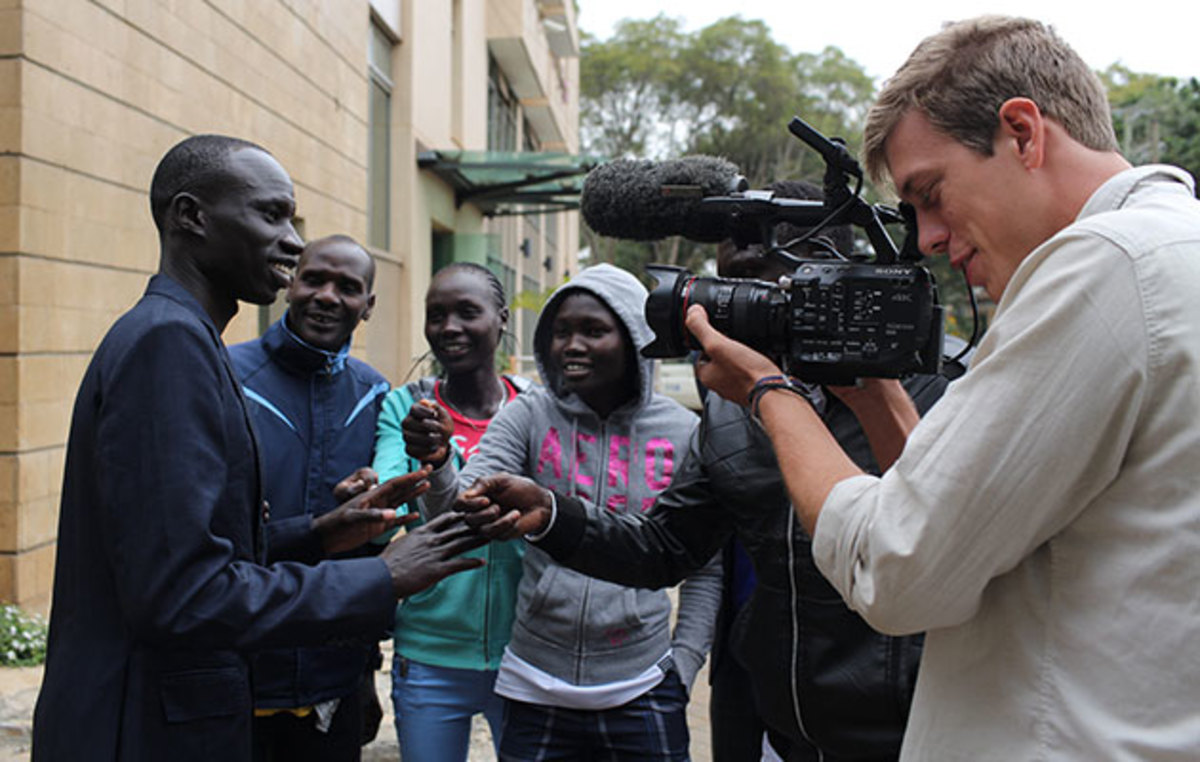
At first sight Loroupe's training center presents a feast for spoiled Western eyes, teeming as it is with all that isn't there. The name prepares you for one of those state-of-the-art sweat palaces built by D-I colleges to woo blue-chippers, yet the four-building facility couldn't be more basic. The orphanage and former trade school features one bench press, one set of weights, and a pair of cows to supply the athletes' twice-weekly ration of milk. Everyone sleeps four to a room. Breakfast is white bread and a cup of sweet tea.
To say that these runners don't know what they're in for next month is no exaggeration. For some, last fall's flight from Kakuma to Nairobi was their first time on an airplane. None of the final five have ever watched an Olympics, much less competed in an elite meet. "They ask us, You guys will be going to Rio?" says Lokonyen. "I didn't even know what is Rio."
But in a sense the refugees have already moved to the cutting edge of modernity, at least by the standards of rural Africa. Growing up in the Pokot tribe, Loroupe heard constantly that because she was a girl, she was "worthless" and shouldn't bother with studies. Her father had four subservient wives. "I was the first girl to do sport in my family and the first to go to school without permission," says Loroupe, 43. "My community, when they realize that you're a very good person, will support you 100%, like a man. But you have to work for it."
Inveighing against tribalism is one thing. But the women who arrived at Loroupe's training center last fall were stunned to hear her rule of daily engagement: The women were not to wait on the men. They all were athletes first, and the men would share the responsibility of cleaning and maintaining the center. After Saturday's morning run both sexes scrambled to sweep the courtyard; Chiengjiek mopped a floor. "We have to follow Madame Tegla," he says. "She is peacemaking."
Perhaps no one was happier to hear that message than Lokonyen. Growing up she loved to play soccer, against her father's wishes; he'd beat her, she'd promise not to play again, then run out the next day to find a game. "If I come back, and he do a quarrel with me or beat me, I just say, No problem," she says. "Because I have passion to play."
In 2002 the 10-year-old Rose began life as a refugee when a gun-toting band of Toposa tribesmen burned her Didinga community in Ngatuba; her family hurried into the bush and within three days made it to Kakuma. If there was anything good about being displaced, it was that unlike back home, she got no grief from elders about playing soccer. In 2007, just about the time the 15-year-old Rose started running in high school, her parents left Kakuma to return to their village and see if any relatives had survived. She hasn't spoken with them since.
"I stayed with my four siblings, and I was the one taking care of them, as the eldest," she says. "I have to come to school and work at the same time for them, fetching water, cleaning the compound and washing the uniforms. It was very hard for me to concentrate in school. Your parents are away, and you don't know if they're still alive. They were supposed to take care of you, yet you're now the one who is taking care of the younger. You are now the parent, and yet you have nothing."
Not quite. Lokonyen is quick to say that she's grateful for Kakuma. The Kenyan camp—which the government is planning to close, having decided to accept no more refugees—provides residents with food, shelter, medical care and schooling. But no one wants to be there for long, and its environs can be dangerous. Shortages of firewood send refugee women out into the bush to forage, where they are often set upon by Kenyans from the surrounding community. "They do rape people in the forest," Lokonyen says. "So many of them. One of the women was raped because she ... didn't know how to run [fast]. I found the woman: She was just crying."
Lokonyen knew how to run fast. Last August, Loroupe, in concert with the UN Refugee Agency, went to Kakuma to quietly hold 10-km qualifying races for men and women; Lokonyen's second-place finish got her an invite to the training center in Ngong. She hesitated for only a moment. Her brother is now 17; she figured it's his time to fetch water and look after the three youngest. She calls once a week. Her siblings go to school hungry sometimes, and she worries about them walking alone.
"This is a great opportunity for me, so I have to go and leave them," Lokonyen says. "God only knows whether they are well, but let them stay. At least they are in their own house, and God will protect them." She pauses. Then she says, "I came out of the family, and I left them alone."
Lokonyen once asked her siblings whether that was the right decision, knowing the answer. It was what any refugee in a camp would say to someone handed a lifeline. Go ahead, they told her. Work hard. Maybe you'll win and make money, enough to come back and change our lives.
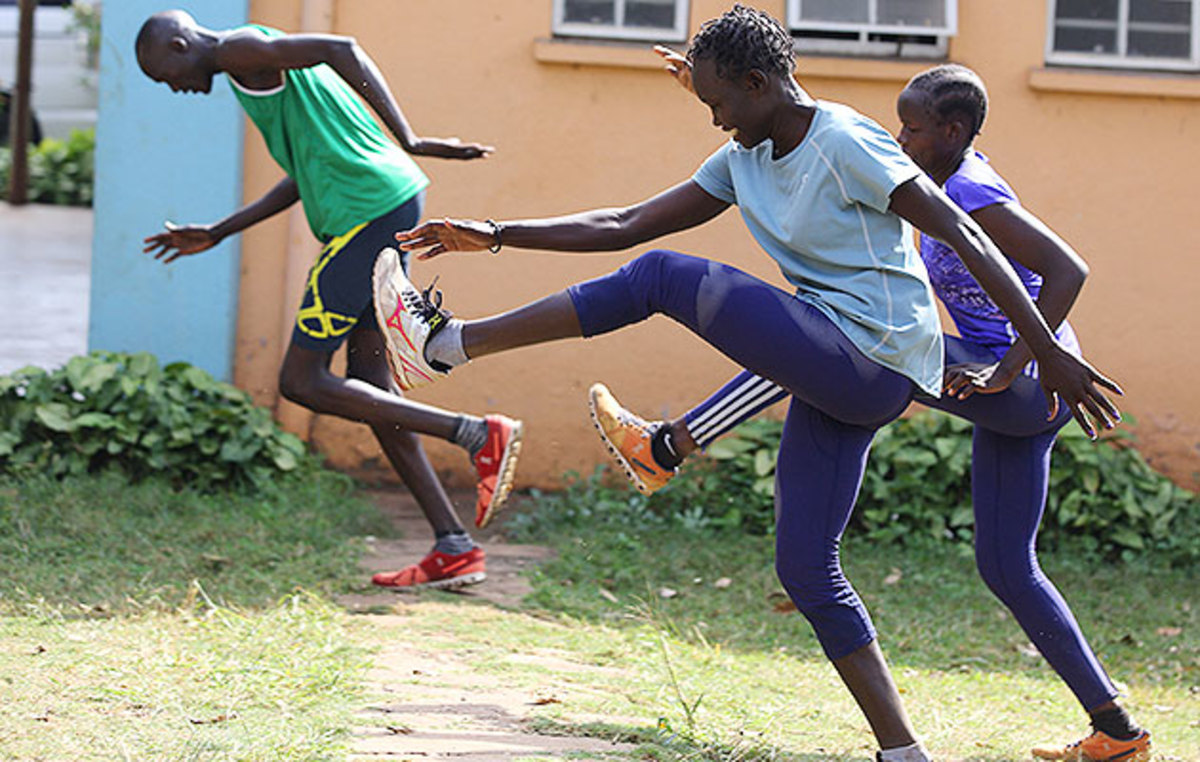
When asked her personal best in the 800, Lokonyen says, "2:22," then smiles and adds, "I need to reduce." It's true: The Olympic qualifying time is 2:01.50. But then, all the South Sudanese runners have come up well short of the qualifying times for their events and been waived into the games by the IOC. Of the 10 refugee athletes, in fact, only marathoner Yonas Kinde would have made it to the Olympics strictly on athletic achievement—had he a nation to represent.
The team's current statelessness, of course, makes membership an honor only if it's temporary; the sooner the athletes lose refugee status, the better. That's why perhaps the most successful candidate in the selection process didn't make it. Taekwondo fighter Raheleh Asemani of Iran was atop the short list after winning the women's under-57kg class in European qualifying in January, but in April she was granted citizenship in Belgium. She will compete under its flag in Rio.
The rest will be guaranteed only a walk in the opening ceremony, a bed in the athletes' village and a place in qualifying. That's plenty, of course, but the refugees point out that they've been training just nine months, while other Olympians have had a lifetime to prepare. Before last October none of the South Sudanese had ever worked out with weights, thought about diet or endured twice-daily practices, timed and charted. None had ever lived as an athlete or raced so often—much less in a cooler climate and under a new kind of stress. Knees barked. Chests got congested. More than half of the runners at Loroupe's training center, including the lone Dinka woman, got sent back to Kakuma or Dadaab. Lohalith came down with malaria.
"A lot of injuries, diseases that never come up: Our bodies were responding," says Lohalith, whose personal best for the 1,500 is 4:52. (Olympic qualifying is 4:07.) "A few managed to bear with it, then the team began a lot of trials. I came up with [a faster] time. Even though we were told, 'You are not that qualified,' at least we were better. Now we are getting used to it. I cannot hope to win, but I will go and try my best to compete—no matter how hard it is. I cannot walk off the field. I have to at least try to finish."
It's impossible to miss the Walter Mitty factor here; Hollywood screenwriters should be taking notes. Being on this team is the closest an Everyman will ever come to competing in the world's most prestigious sporting event. Never mind the irony of trying to prove that refugees are "like anybody else" by lining them up against the most uncommon humans alive. Before their luck turned, Lokoro and Biel herded cattle. Misenga loaded trucks. Chiengjiek was studying to be a car mechanic. Concede an accident of fate, of being born in the wrong place at the wrong time, and they've been like anybody else all along.
• The Alex Ngan saga: How a flight delay dashed a swimmer’s Rio dreams
Still, they don't want to hear that. The five South Sudanese runners intend to return to Loroupe's training center after their longest journey yet (Nairobi to Johannesburg to Rio and back again); they want to see if, with more training, they actually can be elite athletes. And it looks as if Madame Tegla will have them. The IOC's $2 million training fund is all but exhausted, Miró says, but he expects it to be renewed. "We have a lot of, let's say, offers to cooperate in something for these 10 people," he says. "What we'd like is that these offers will continue after the Games for many other people."
All of the South Sudanese runners speak of wanting to follow Loroupe's example: win races around the world, build careers, pass on what they've learned. "If I do something better in my life, I want to help the refugees who have suffered like me," Lokoro, 24, says. "So many refugees have talent but don't have a chance. I want to have a place like this so they can rise up, run and go somewhere, visit other continents like me now. It is all opening up for me. My life, it's like a new one."
Unwittingly, perhaps, the IOC has given the 10 something they've never had—a bit of control. Refugees, especially young ones, spend most of their lives shunted about by great forces such as war, climate, tribe and bureaucracy. Even now the refugee Olympians are being directed daily by Loroupe's foundation, coaches, UN refugee officials, media handlers and the imperatives of the IOC. But for the first time they've been given room to hope, and better: to make a plan.
"I know I have a message to tell the world," Biel says. "First, I feel a lot of pressure because millions of refugees are looking to us to tell what they are living. Secondly, it's about my nation: South Sudan. If I succeed and only go live abroad, there's no legacy that I give to other people. I want to come back and serve the nation, show them the way as a peacemaker, tell the world that we can challenge our leaders. Because the leaders make the problems. Thirdly, it's about my family. The background I come from; it's a terrible history, you see. I must change that. Maybe I can go back to that village now to help the young people. Because I know that it's not only my family that was suffering, and I can go serve them. I am going to rescue my people from that disaster."
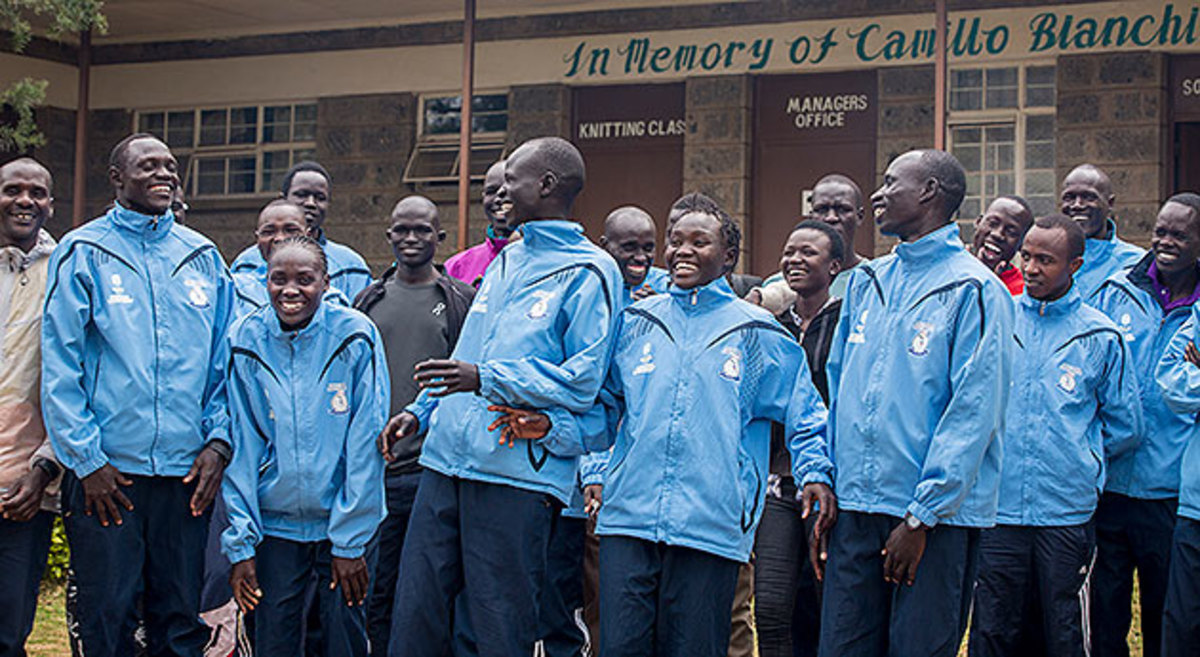
No, Yiech Pur Biel didn't die. Because what the refugees say is true, of course: They are not animals. They are like anyone else, capable of great good amid even the worst times. The neighbor lady, Rebecca Nyagony Chuol, did not desert Biel the day after his mother walked away in 2005—though no one would have blamed her if she had. Her husband had just been killed, and she had two boys to raise alone, and the UN people triaging the chaos in Nasir had tabbed Chuol and her children to be rescued first. The truck for Kakuma was filling up. "We are going," Chuol told Biel. "But I don't think your mother is coming back. And we're not going to leave you here."
So she told the UN refugee workers that Biel was part of her family. And he went with her to Kakuma and lived with her like a third son. "I call her Mom because she's caring for me and treats me the same as she did her own children," Biel says. "They saved my life."
He didn't grow up running. He loved soccer; a lanky defender ranging across the grassless pitches of Kakuma, he could go all day if asked. He ran the occasional school relay, to help out, but never more than a lap or two. Then, a year ago, a posting went up in the camp: Tegla Loroupe was coming in August to stage a 10-km race, and the best would earn spots at her training center and a chance at the Olympics. Biel liked that runners controlled their own fate. He thought, Why not me?
He had one pair of sneakers, barely; holes gaped under the balls of both feet. "There was no sole," he says. "I was tying them, and I say, God help me now."
Biel, running the whole way on his toes, finished third. The flight from Kakuma to Nairobi was his second, the first having come when the UN flew Chuol's family into Kakuma a decade before. After news got around that Biel was one of the 30 chosen, he received a phone call from an uncle in Juba. "Your family is alive," the man said. "Your mother, your brother, even your father. They are all back in Nasir."
Biel has no idea if this is true. He still hasn't spoken to anyone in his family, can't go back himself and says that in his culture, people lie rather than confirm bad news long-distance. "I cannot believe it," he says, "because when you are far away, they cannot tell you the truth: They don't want you to be hurt. But sometimes I think about it and say, O.K., maybe they are alive, and it makes me happy. I say ... maybe. Imagine: For 12 years I never see my father, and then this guy tells me that he's alive. It's hard."
Still, all the while Biel kept working, improving, surviving cuts: when 16 of the originals at Loroupe's training center were replaced in February, when the IOC named the 43 final candidates worldwide in March, when the list of candidates at the training center was sliced down to 14 later that spring. And with each step an idea took firmer shape: If he makes something of this chance, makes any money, he will get Chuol and her sons out of Kakuma. "That is the way I can thank them," Biel says.
• RIO OLYMPICS PREVIEWS: Men’s basketball | Women’s basketball | Rugby | Diving | Tennis | Triathlon
On June 3 the runners gathered inside the social hall at Loroupe's training center for the IOC's announcement. No hints had been given. The coaches kept warning them: Only one of you might go to Rio. It's O.K. Don't despair if you're not chosen.
A video screen popped to life, relaying the image of Thomas Bach sitting at a table in Lausanne, Switzerland. Some runners prayed. Some felt their hands shaking. Then they heard their names being read from far away, one by one, five of them inside that room in Kenya. "It felt like a dream," Lokoro says.
The first was Biel's. At the unreal sound of it—him, his name!—coming out of a TV on a wall, his eyes filled. He thought about his mother and the last time, 11 years ago, he had cried. Now he wept again, happily. When the cameras and reporters and his teammates crowded around him, he could barely speak.
"It was too big," Biel says, but if you've never lost everything, you might not understand. That was the bell signaling the last leg of a long, desperate run. A refugee is on the move. Cheer hard. Look at him—look at all of them—go.
